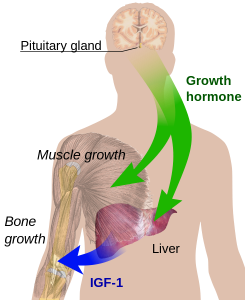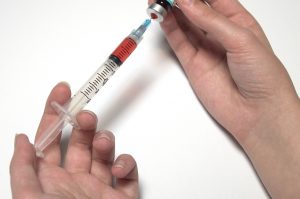Growth is a central part of our lives. After all, the way we look is constantly changing as we mature into adults during adolescence and go down the inevitable path to old age. A major player in this continued development is growth hormone.
And far from only being important during puberty, growth hormone continues to have a large impact on our health for the rest of our lives. Indeed, a decrease in growth hormone levels is believed to be one of the main reasons we gain more fat and lose muscle as we get older.
While it may not be the fabled “fountain of youth” that some have claimed, optimal growth hormone levels can certainly improve the quality of life for older adults.
In this guide, we’re going to focus on what growth hormone does, how it can be beneficial, and how you can improve your natural growth hormone levels through supplementation.
What is Growth Hormone?

Rather than being released continuously, GH is secreted in bursts, particularly after exercise and during sleep. In addition, levels can also increase during times of stress, fever, and fasting.
Once released, GH works by binding to special receptors found on target cells. It’s biological effects are best described as being “anabolic”, meaning that it promotes the building of more complex molecules. More specifically, GH promotes the production of protein, utilization of fat, raises blood sugar levels, and stimulates IGF-1, another hormone which controls growth and development.
In children and teenagers GH also promotes the growth of bone and other tissues. As such, it’s not surprising that GH secretion is highest during puberty, and tends to decrease by about 14% every following decade.
Growth Hormone Benefits
Growth hormone levels naturally decrease as we age, which is one of the major reasons why we lose muscle and put on more body fat as we get older.
In addition, GH also appears to be involved in immune system function, mental health, and other areas. As a result, boosting GH through dietary supplements is now becoming a popular way of staving off the negative effects of aging, particularly for men.
Muscle Mass

Similar to testosterone, the promotion of muscle growth is arguably the most documented and sought-after effect of growth hormone. There’s a reason why people with GH deficiency and older adults have greatly reduced muscle mass, while bodybuilders that inject GH directly are able to increase their muscle mass far beyond natural levels.
Scientists believe the main way GH achieves this is by stimulating the production of insulin-like growth factor 1 (IGF-1), another protein hormone that plays a key role in the regulation of muscle tissue, although it likely has IGF-1-independent mechanisms as well.1
Fat Loss
Growth hormone is also known to stimulate lipolysis — the breakdown of fats — which is believed to be one of the reasons why we put on more body fat as our GH levels fall with age. Coupled with its effects on muscle mass, this benefit is the biggest reason people seek to raise their GH levels.2
Mental Health

For one thing, people with impaired GH levels suffer from a variety of mental problems related to alertness, well-being, memory, and overall cognitive function. In turn, treating such cases with GH therapy has been shown to significantly improve symptoms. Furthermore, the fact that GH has been found to affect the central nervous system (CNS) indicates that it must play some role in cognitive well-being.
Immune System
In addition to its more established effects, growth hormone has also been implicated in regulation of the immune system. For example, research suggests that GH influences certain cells involved in immunity, such as stimulating the multiplication of T and B cells (lymphocytes), white blood cells that protect the body from illness and infection.
Bone Health
Bone density decreases as we age and can lead to a variety of bone problems. Growth hormone has been shown to increase bone density in older adults and people with GH deficiency.
Skin Thickness
It may not be the most obvious hallmark of aging, but skin does get thinner as we age, at a rate of about 7.2% per decade for men and 5.7% for women. Thankfully, it looks like growth hormone can be helpful here as well, as its administration in older adults has been shown to increase skin thickness by 7.1% alongside increasing muscle mass and decreasing fat.
Other Potential Benefits
In addition to the above effects, optimal GH levels may also improve sleep, energy, and possibly even affect skin and hair health. However, these supposed benefits have seen little to no research and as such remain largely hypothetical.
What are Growth Hormone Boosters?
Growth hormone boosters, also called growth hormone releasers or growth hormone secretagogues, are dietary supplements capable of increasing the body’s natural growth hormone levels rather than supplying GH directly.
Types of Growth Hormone Boosters
For a closer look at specific supplements used to boost growth hormone, check out our GH supplements list.
Herbal
Herbs such as Mucuna pruriens (velvet bean) and fenugreek have been suggested to have GH-promoting activity. Herbal GH boosters are typically standardized to contain a certain amount of the main bio-active ingredient, such as L-dopa for velvet bean.
Interestingly enough, these particular herbs are also known for boosting testosterone — another key anabolic hormone. This makes herbal GH boosters an excellent choice for older men looking to improve both testosterone and GH simultaneously.
![By Kurt Stüber [CC-BY-SA-3.0], via Wikimedia Commons](https://supplementsinreview.com/wp-content/uploads/2016/10/fenugreek-seeds.jpg)
Amino acids
A number of amino acids have been demonstrated to raise GH levels, with arginine being the most studied example. Such amino acids likely work by suppressing the release of somatostatin, also known as growth hormone–inhibiting hormone (GHIH). Other potential candidates include ornithine and glutamine.
Sleep aids
Because the large majority of GH is released while we’re asleep, supplements that improve sleep quality can indirectly boost GH levels. In addition, sleep aids such as melatonin and GABA have been shown to increase GH concentrations directly as well.
Synthetic drugs
Synthetic drugs capable of increasing GH are known as growth hormone-releasing peptides (GHRPs) and growth hormone secretagogues (GHS). These compounds — first discovered in the 1980s –mimic the action of the hunger hormone ghrelin by stimulating GH secretion via unique receptors present in the pituitary gland.
GHRPs have been found to be highly effective at increasing GH levels in healthy elderly and obese individuals. One of the best known examples of GHS is MK-677, which is currently sold under the brand names Ibutamoren and Nutrobal.
How do Growth Hormone Boosters Work?
Given its multi-faceted role in human health, growth hormone is controlled by a complex system of checks and balances. This also means that there are many different mechanisms through which supplements can naturally and safely raise GH levels.
Suppress growth hormone–inhibiting hormone

Promote growth hormone-releasing hormone
Somatoliberin or growth hormone-releasing hormone (GHRH) has the opposite effect to GHIH, and results in the synthesis and release of GH by the pituitary gland. As such, compounds that promote GHRH increase the body’s GH levels.
Stimulate growth hormone secretagogue receptor
The hunger hormone ghrelin is capable of stimulating growth hormone release by activating a unique set of receptors in the pituitary gland known as growth hormone secretagogue receptors (GHSRs). In the 1980s, researchers began identifying synthetic compounds that were also capable of stimulating these same receptors.
Stimulate the alpha-4 beta-2 nicotinic receptor
Alpha-4 beta-2 (a4b2) nicotinic receptors are another specific subtype of brain cell receptors that promote GH release when stimulated. This means that taking certain compounds capable of binding to and activating these receptors — such as nicotine — can increase GH secretion.
Improve sleep quality

Given that the large majority of GH is released while we sleep, it’s not surprising that enhancing sleep quality can have a positive impact on GH levels. In particular, clinical research shows that sleep deprivation significantly decreases the overnight surge of GH, and that GH levels are highest during deep sleep — the most restful stage of sleep that is particularly associated with recuperation.34
Are Growth Hormone Boosters Legal?
Like all substances classified as dietary supplements, growth hormone boosters are safe and legal. Furthermore, their recreational use does not appear to be regulated by any governing agency, while their use as a performance-enhancing compound for sports appears to be perfectly legal under the rules of the World Anti-Doping Agency (WADA).
Clarification: GH Boosters vs. Hormone Therapy

Much as the case with testosterone, there is a very big difference between using growth hormone boosters and growth hormone replacement therapy. Rather than supplying GH directly into the body, growth hormone boosters seek to raise the body’s GH levels through natural means and have little to no side effects.
Growth hormone therapy, on the other hand, involves injecting actual human growth hormone into the body to artificially bring up its levels. What’s more, this practice is associated with a high risk of significant side effects that include fluid retention, joint and muscle pain, carpal tunnel syndrome, and high blood sugar.
Do Growth Hormone Boosters Have Side Effects?
It’s difficult to give a blanket statement for all growth hormone boosters because they include a large variety of compounds that produce their effects via different mechanisms.
Generally speaking however, growth hormone boosters do not have any serious side effects because they work via natural mechanisms. But if you want to be diligent, it’s best to take a look at the possible side effects of the specific product you’re intending to take.
What is the Best Growth Hormone Booster?
![MK-677 molecular structure. By Anypodetos [CC0 1.0], via Wikimedia Commons](https://supplementsinreview.com/wp-content/uploads/2016/10/mk-677-molecular-structure-300x175.png)
Clinical trials of MK-677 have shown that it is relatively safe and not only increases GH levels in healthy individuals, but also results in subsequent benefits such as significant muscle gain and improved sleep. Furthermore, it has even been shown to increase concentrations of IGF-1 — which is used as a reliable indicator of GH levels — in elderly individuals to the level found in young adults.
Conclusion
Growth hormone is an important regulator of growth, body composition, metabolism, and overall health in both men and women. Although growth hormone won’t stop the aging process, it’s certainly advantageous to keep your GH at optimal levels to reap its many benefits as you get older.
And given the side effects and costs associated with growth hormone therapy, it’s far more sensible to use dietary supplements to naturally boost your GH. Finally, don’t forget to pair supplementation with exercise and a healthy diet for the best possible results, as these lifestyle factors are among the most effective at naturally elevating growth hormone release.
